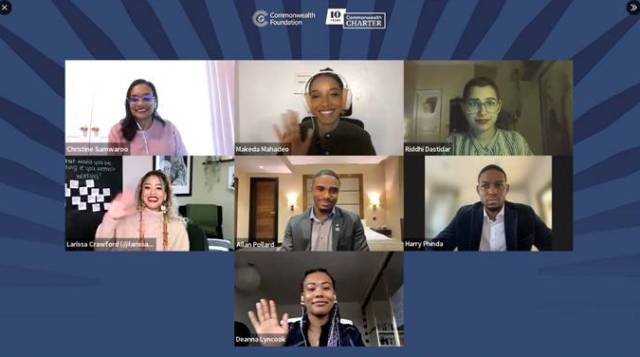 From the Commonwealth Foundation's Young Leaders’ Dialogue video [courtesy the Commonwealth Foundation]
From the Commonwealth Foundation's Young Leaders’ Dialogue video [courtesy the Commonwealth Foundation]
Ten years after the signing of the Commonwealth Charter in 2013, the spotlight is being put on how far Commonwealth member-states are living up to the values in the agreement.
On 13 March, Commonwealth Day, King Charles III fired the starting pistol for renewed focus on the Charter by resigning the document, originally signed by his mother, Queen Elizabeth II.
As the new Head of the Commonwealth, King Charles also pressed home the importance of the Charter in his Commonwealth Day message, stating that the document “gives expression to our defining values – peace and justice; tolerance, respect and solidarity; care for our environment, and for the most vulnerable among us”.
In the days that followed, two Commonwealth bodies placed even more focus on the Charter in conferences held in London and online.
“The impatience of youth”
Australian jurist and academic, the Hon. Michael Kirby, who served as a Justice of the High Court of Australia from 1996 to 2009, delivered the keynote lecture at an Institute of Commonwealth Studies (ICwS) conference on Soft Power in the Contemporary Commonwealth: Approaches, Opportunities and Challenges on 15 March.
In his address, Mr Kirby outlined how the Charter came about almost as an “accidental development” in discussions between Commonwealth movers and shakers at the time but yet was a key statement of the Commonwealth’s values.
Talking about the Charter’s role today, he referenced the “important statement” by King Charles on the Charter during his Commonwealth Day address.
Mr Kirby added that the comments made by young people in recent podcasts about the Commonwealth also boded well for the future of the Charter’s values. In the Q&A session following his ICwS lecture, he said that he was heartened by what he described as “the impatience of youth” which, he said, is “good for the Commonwealth” to counter complacency.
The Charter of the Commonwealth 2011-13: origins, text and potential – Michael Kirby
A Centenary Reflection on the Australian Constitution the Republic Referendum, 1999 – Michael Kirby
He also responded to comments about the lack of action on rejuvenating the Commonwealth Ministerial Action Group (CMAG). He said that the institution was important for the Commonwealth but “those with power dictate its use”.
Michael Kirby’s keynote address on the Charter’s origins, what it means today and follow-up Q&A session [ICwS video]:
Video of Institute of Commonwealth Studies conference on Soft Power in the Contemporary Commonwealth: Approaches, Opportunities and Challenges [ICwS video]:
What the Charter means today
The Commonwealth Foundation organised a meeting on 16 March entitled A Decade of the Commonwealth Charter: Where to Now? What do we need for the next decade? It included a range of recorded views on the Charter from the Commonwealth’s current and former Secretaries-General and from young people.
What young people think about the Commonwealth Charter [Commonwealth Foundation video]:
Foundation Director Anne Gallagher described this as “an important time for our Commonwealth and its future”.
The keynote address at the Foundation’s event was also delivered by Michael Kirby.
On the Charter today, Mr Kirby said: “We have got this halfway house … The principles are there. So how do we bring them to action … We have got to get practical action. Not just words and ideas.”
Phyll Opoku-Gyimah (aka Dr Lady Phyll), the executive director of Kaleidoscope, the UK’s leading charity upholding human rights of LGBT+ people, spoke of the importance of applying the Charter values when considering LBGTQ+ people.
The new law fuelling anti-gay hatred in Uganda is Museveni’s ‘dead cat strategy’
Is the Commonwealth Stonewalling on LGBTQ+ Rights?
Digital declaration
The Commonwealth Foundation and other Commonwealth organisations have also launched a digital declaration, currently being circulated around Commonwealth networks.
The Foundation states in its introduction that: “Upholding political values means holding ourselves and others to a higher standard … This is why the Charter matters. Quite simply, when people and governments across the Commonwealth proudly and boldly endorse shared values—they are more likely to uphold them.”
The Commonwealth Foundation has asked people to continue the conversation online with the hashtag #ValuesIntoAction.
Charter conflict
As the hashtag suggests, Commonwealth Week has only been the starting pistol on what could be a long year of the Charter as focal point for things wrong across the Commonwealth.
On Commonwealth Day itself, some of the protestors outside Westminster Abbey shone a spotlight on the anti-LGBT legislation landing before the Ugandan parliament.
Within two weeks, the legislation had passed through parliament, awaiting the signing into law by the president. Human rights and LGBT rights-based groups used the Charter as the backdrop for criticism of Commonwealth silence on these developments in Uganda.
Yahoo news said on 24 March that UK human rights activist Peter Tatchell had “said the new legislation would violate Sections 2 and 4 of the Commonwealth Charter if it is signed into law by President Yoweri Museveni, who has previously said he supports the bill”.
The news portal’s royal reporter added that “Tatchell called on King Charles and the Commonwealth Secretary General, Baroness Scotland, to acknowledge at the very least that this law would be in conflict with the values of the Commonwealth’s Charter.”
It was clear that the Charter’s role as a lightning rod for human rights issues across the Commonwealth in 2023 was underway.
Debbie Ransome is the web editor for the Commonwealth Round Table
Related articles
Trends in International Criminal Justice and the Commonwealth – ICwS podcast by incoming director Kingsley Abbott.
The Charter of the Commonwealth 2011-13: origins, text and potential



